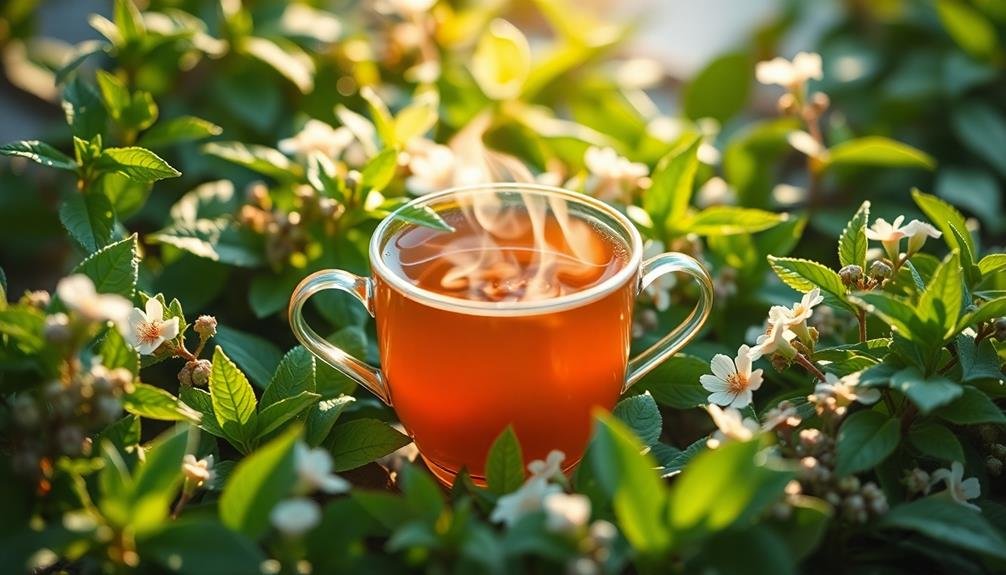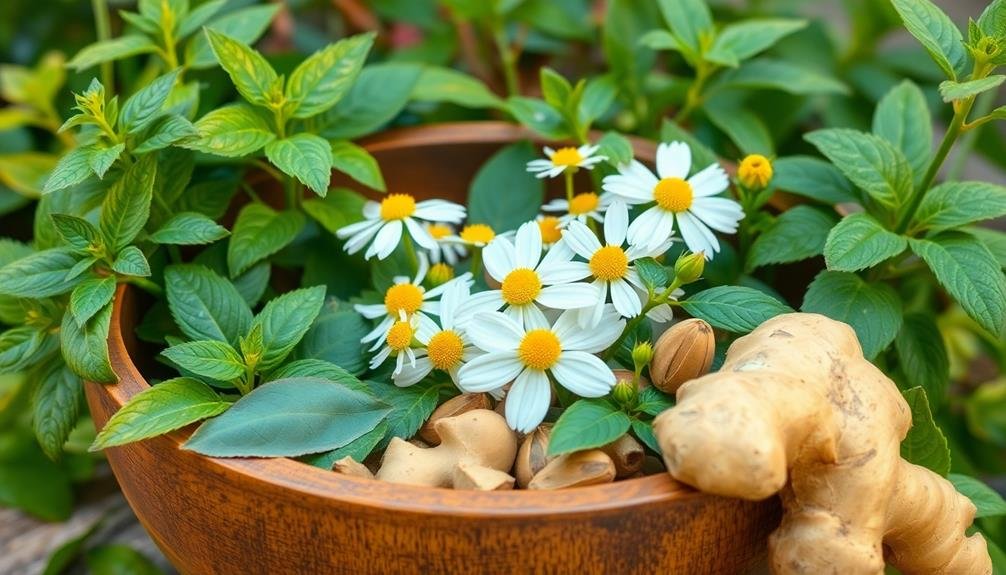Making tulsi tea your go-to aromatherapy blend is an excellent choice for its powerful health benefits. This tea, infused with anti-inflammatory and antibacterial properties, can support your immune system while helping you feel calm and focused. The aromatic qualities of tulsi elevate your mood and create a soothing atmosphere, making it perfect for stress relief. You'll love how it promotes relaxation and clarity of mind, turning your tea time into a comforting ritual. Plus, you can easily enhance its flavor with honey or lemon. Discovering more about preparation and tips can elevate your daily experience even further.
Tulsi Tea Overview

Tulsi tea, often referred to as holy basil tea, is a herbal infusion celebrated for its numerous health benefits and soothing properties. You might find it particularly appealing if you're looking for a natural remedy to enhance your well-being. This tea is derived from the leaves of the Tulsi plant, which has been revered in traditional medicine for centuries.
When you sip on Tulsi tea, you're not just enjoying a flavorful beverage; you're also tapping into its rich profile of antioxidants and essential oils. These compounds can help reduce stress and promote relaxation, making it an excellent choice for winding down after a long day.
Moreover, Tulsi tea is known for its anti-inflammatory and antimicrobial properties, which can support your immune system. If you're feeling under the weather, a warm cup of this tea might just do the trick in helping you feel better.
Brewing Tulsi tea is simple: steep the leaves in hot water for about five to ten minutes. You can enjoy it plain or add a touch of honey or lemon for extra flavor.
Embrace this herbal infusion and discover the calming effects it can bring to your daily routine.
Aromatherapy Benefits Explained
When you enjoy tulsi tea, you're not just savoring a delicious beverage; you're also tapping into its powerful aromatherapy benefits.
This blend offers stress relief, supports your immune system, and enhances your mood.
Let's explore how these effects can positively impact your well-being.
Stress Relief Properties
Aromatic blends containing Tulsi tea are renowned for their exceptional stress relief properties. When you brew a cup, you're not just enjoying a warm drink; you're tapping into a centuries-old remedy that helps soothe the mind and body. Tulsi, also known as holy basil, has adaptogenic qualities that can help you manage stress more effectively.
Here's a quick look at how Tulsi tea can help you combat stress:
| Benefit | Description |
|---|---|
| Reduces Cortisol Levels | Tulsi tea helps lower cortisol, the stress hormone, keeping your mind calm. |
| Promotes Relaxation | The aroma of Tulsi promotes relaxation, making it easier for you to unwind after a long day. |
| Enhances Mood | Regular consumption can elevate your mood and provide a sense of well-being. |
Immune System Support
Harnessing the power of Tulsi tea can greatly bolster your immune system, providing a natural defense against illness. This sacred herb, often referred to as holy basil, is packed with antioxidants and essential oils that help your body combat infections and diseases. Drinking Tulsi tea regularly can enhance your body's resilience, making it more capable of fighting off harmful pathogens.
The anti-inflammatory properties of Tulsi also play a significant role in immune support. When your body's inflammation levels are balanced, it can focus its energy on warding off illnesses rather than dealing with chronic inflammation.
Plus, Tulsi tea is known for its adaptogenic qualities, which means it helps your body adapt to stress and maintain homeostasis. When stress levels decrease, your immune system can function more effectively.
Incorporating Tulsi tea into your daily routine not only offers you a delicious beverage but also serves as a proactive measure for your health. Whether you sip it in the morning or unwind with it in the evening, you're making a choice that supports your immune system and promotes overall well-being.
Mood Enhancement Effects
In addition to its immune-boosting properties, Tulsi tea also offers remarkable mood enhancement effects that can elevate your overall well-being. When you sip on Tulsi tea, you're not just enjoying a flavorful beverage; you're also tapping into its adaptogenic qualities, which help your body manage stress more effectively.
The aroma of Tulsi can uplift your spirits and promote a sense of calm. Many people find that the scent alone helps clear their minds, making it easier to focus and stay present.
By incorporating Tulsi tea into your daily routine, you may notice a decrease in anxiety and an increase in feelings of happiness and contentment.
Whether you're having a tough day at work or feeling overwhelmed by daily challenges, a warm cup of Tulsi tea can serve as a comforting ritual. Its natural compounds, like eugenol and rosmarinic acid, work to balance your mood, helping you feel more grounded.
Key Ingredients in Tulsi Tea

Tulsi tea, often celebrated for its remarkable health benefits, features a blend of key ingredients that contribute to its unique flavor and therapeutic properties. At the heart of this tea is the tulsi plant, also known as holy basil. Its leaves are packed with essential oils, vitamins, and antioxidants that promote overall wellness.
You'll find that tulsi contains eugenol, which has anti-inflammatory and antibacterial effects, making it a powerful ally in combating infections and reducing stress. The other components, like rosmarinic acid, help with respiratory health and can alleviate allergies.
Alongside these, you'll notice hints of flavors from ginger, lemongrass, or cardamom in some blends. Ginger adds a warming spice that can aid digestion and boost immunity, while lemongrass contributes a rejuvenating citrus note that enhances the tea's aromatic experience.
Cardamom not only heightens the flavor profile but also aids digestion and promotes oral health.
Together, these ingredients create a harmonious blend that not only tastes great but also supports your physical and mental well-being.
Whether you're looking to relax or revive, tulsi tea brings a delightful combination of flavors and benefits.
Preparing Your Tulsi Tea Blend
When preparing your Tulsi tea blend, start by choosing fresh Tulsi leaves to maximize flavor and aroma.
Next, you'll want to explore different brewing techniques to get the perfect infusion.
Don't forget to contemplate enhancing the flavor with various options to suit your taste!
Choosing Fresh Tulsi Leaves
Choosing the right fresh leaves can greatly enhance your Tulsi tea blend. When you're selecting Tulsi, look for vibrant, green leaves that are free from spots or discoloration. Freshness is key, so opt for leaves that feel firm and fragrant. If you can, try to pick them from a local herb garden or a trusted source to guarantee quality.
Next, consider the variety of Tulsi you want to use. There are several types, including Rama, Krishna, and Vana Tulsi, each with its unique flavor profile and aroma. Rama Tulsi offers a milder taste, while Krishna Tulsi has a slightly peppery kick. Experimenting with different varieties can lead to delightful discoveries in your tea blend.
Once you've chosen your leaves, wash them gently under cool water to remove any dirt or impurities. Pat them dry with a clean towel to preserve their natural oils.
Fresh leaves should be used promptly to maintain their potency; however, you can also store them in the refrigerator for a short time if needed. Choosing fresh Tulsi leaves will guarantee that your tea isn't only delicious but also packed with beneficial properties.
Brewing Techniques Explained
Preparing your Tulsi tea blend can be a rewarding experience, and mastering the right brewing techniques is essential for extracting the best flavors and benefits.
Start by boiling fresh, filtered water in a kettle. Aim for about 8 ounces per serving, as this allows the flavors to unfold beautifully. Once your water reaches a rolling boil, remove it from heat and let it cool for about 30 seconds. This slight cooling is key, as boiling water can scorch the delicate leaves.
Next, add your fresh Tulsi leaves—about 1 to 2 teaspoons per cup—to a teapot or infuser. Pour the hot water over the leaves and cover the pot to trap the steam and heat. Let it steep for 5 to 10 minutes, depending on your taste preference. The longer you steep, the more robust the flavor will be.
Once steeped, strain the tea into your favorite cup. If you've used loose leaves, consider using a fine mesh strainer for a smooth finish.
Enjoy your Tulsi tea warm, and feel free to savor the calming aroma that accompanies each sip.
Enhancing Flavor Options
To elevate the flavor of your Tulsi tea blend, consider mixing in complementary ingredients that enhance its natural sweetness and aroma. A popular choice is honey, which not only adds sweetness but also brings its own health benefits. Just a teaspoon can transform your tea into a soothing experience.
Cinnamon is another fantastic addition. Its warm, spicy notes pair beautifully with Tulsi, creating a comforting aroma that's perfect for relaxation. You can either sprinkle in some ground cinnamon or steep a cinnamon stick alongside your Tulsi leaves.
If you prefer a citrusy twist, try adding a slice of lemon or a splash of fresh orange juice. The brightness of citrus balances the herbal notes of Tulsi, making each sip invigorating.
For those who enjoy a hint of spice, a dash of ginger can give your tea a zesty kick. You can grate fresh ginger or use dried ginger powder, depending on your taste.
Experiment with these ingredients to find your perfect blend. With each variation, you'll discover new depths of flavor that make your Tulsi tea even more enjoyable and aromatic.
Enhancing Your Aromatherapy Experience

Aromatherapy can transform your space and elevate your mood, especially when you incorporate tulsi tea into your routine. The rich aroma of tulsi, with its earthy and slightly spicy notes, can create a calming atmosphere that promotes relaxation and mindfulness.
When you brew a cup of tulsi tea, the steam carries its fragrant oils, filling the air with a soothing scent that enhances your overall experience.
To enhance your aromatherapy experience, consider pairing your tulsi tea with complementary scents. You might add a few drops of essential oils like lavender or lemon for an extra boost of tranquility or invigoration.
Experimenting with different combinations can create a personalized blend that resonates with your mood and intentions.
Creating a dedicated space for your tea ritual can also amplify the benefits. Set up a cozy nook with soft lighting, comfortable seating, and perhaps some calming music.
This intentional environment allows you to fully immerse yourself in the experience, making it more impactful.
Tips for Daily Use
Incorporating tulsi tea into your daily routine can bring a sense of balance and well-being. Start your day with a warm cup of tulsi tea to set a positive tone. This ritual not only awakens your senses but also helps reduce stress right from the morning.
Consider brewing a fresh cup during your work breaks to clear your mind and refocus. You can also enjoy tulsi tea in the afternoon, especially if you're feeling fatigued. Its natural properties can boost your energy without the jitters associated with caffeine.
If you prefer a soothing evening routine, sipping tulsi tea before bed can help you unwind and prepare for a restful night's sleep.
Don't forget to experiment with flavors! You can add a dash of honey, a slice of lemon, or even some ginger to enhance its taste. Keeping a thermos of prepared tulsi tea handy can encourage you to make it a regular habit.
Frequently Asked Questions
Can I Use Tulsi Tea for Meditation Practices?
Yes, you can use tulsi tea during meditation practices. Its calming properties help you focus, enhancing your mindfulness. Sip it before or during your session to create a serene atmosphere and deepen your meditation experience.
Is Tulsi Tea Safe During Pregnancy?
Tulsi tea's generally considered safe during pregnancy, but it's best to consult your doctor first. They'll help guarantee it won't interfere with your health or your baby's development, keeping you both safe and comfortable.
How Often Should I Drink Tulsi Tea?
You can drink tulsi tea once or twice a day for its benefits. Listen to your body; if you experience any discomfort, adjust your intake. Enjoy its calming effects and explore different flavors!
What Are the Side Effects of Tulsi Tea?
Tulsi tea's side effects can include stomach upset, drowsiness, or allergic reactions in some individuals. If you're pregnant or have specific health conditions, it's best to consult your doctor before enjoying this herbal tea.
Can Tulsi Tea Interact With Medications?
Yes, tulsi tea can interact with certain medications. If you're taking blood thinners, diabetes medications, or sedatives, it's best to consult your doctor before adding it to your routine to avoid potential complications.
In Summary
Incorporating tulsi tea into your daily routine can elevate your aromatherapy experience and promote overall well-being. Its calming properties, combined with its rich blend of ingredients, make it a powerful ally in your wellness journey. Whether you sip it during a quiet moment or use it in a blend, you'll find it energizing and soothing. So, embrace tulsi tea as your go-to aromatherapy blend and enjoy the myriad benefits it brings to your life!





Leave a Reply